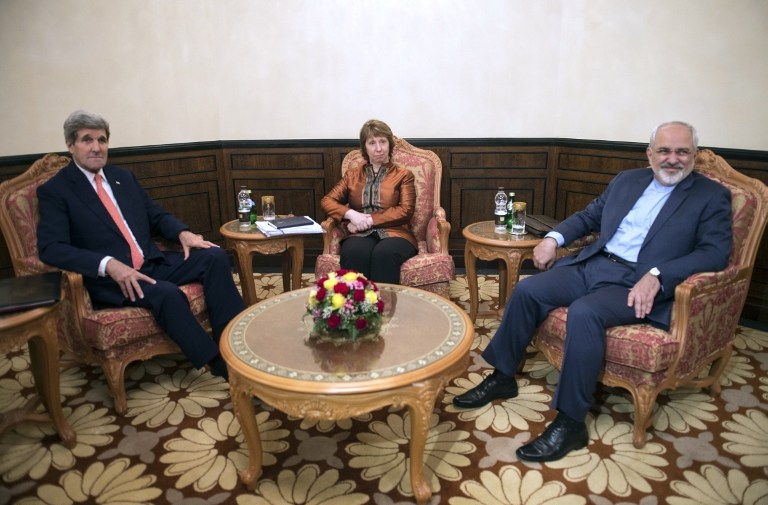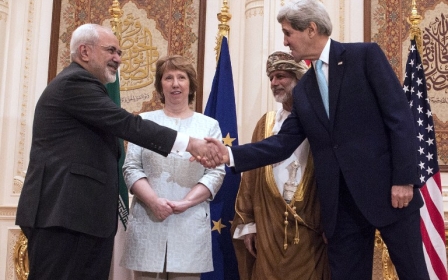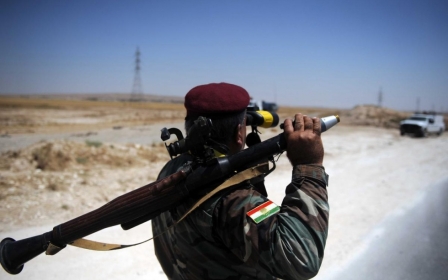Iran nuclear talks in final push ahead of November deadline

Iran and six world powers arrived in Vienna Tuesday seeking to nail down a nuclear deal, six days before a deadline while differences remain significant despite months of negotiations.
The United States, China, Russia, Britain, France and Germany (the P5+1) want Iran to scale down its nuclear programme to make it virtually impossible for Iran to assemble an atomic bomb. On the other hand, Iran, which says its nuclear aims are exclusively peaceful, wants sanctions lifted and a recognition of its "right" to a peaceful nuclear programme.
The interim deal agreed between Iran and the P5+1 on 24 November 2013 in Geneva, expires on Monday after the two sides missed a 20 July deadline to reach a comprehensive accord, and decided to extend talks for another four months.
If such an accord is reached, it would consign to history one of the most intractable geopolitical challenges as well as silence talk of war, put Iran and the West on the road to normalised relations after a 35-year freeze and give US President Barack Obama a significant foreign policy success.
The US has signalled that a final deal is unlikely however.
"There's still a big gap. We may not be able to get there," Obama warned last Sunday.
Former top US diplomat on non-proliferation Robert Einhorn, now an expert with the Brookings Institution, agrees: "There is virtually no possibility that a complete deal will be concluded by 24 November," he told AFP.
A partial deal?
Observers believe that while a final deal is difficult to finalise by next week, one of two other scenarios is more likely to happen.
The first scenario would be for the two sides to strike a partial deal, outlining the major aspects of progress reached so far.
“While most diplomats agree that there is a very slight chance of a deal reached by 24th, the question is whether a framework deal could be reached, whereby the two sides note what they’ve agreed so far and fill in the gaps in a few more weeks or months of negotiations,” said Shashank Joshi, senior research fellow at the Royal United Services Institute (RUSI).
A noteworthy highlight of a partial deal would be that both sides could use this tangible progress to garner public support for the decade-long rapprochement efforts between Iran and the West.
Ellie Geranmayeh, visiting fellow for the Middle East and North Africa Programme at the European Council for Foreign Affairs (ECFR) agrees saying that what is now being talked about as a possible option on the 24th is an accord of the “the broad parameters of a comprehensive deal” which she called the “Joint Plan of Action Plus”.
This type of “Joint Plan of Action Plus agreement can be used by both Iran and the US to garner support from back home and provides the opportunity to carry on talks without being attacked for a stalemate situation in the negotiations,” said Geranmayeh.
But while Geranmayeh sees the two sides potentially reaching an enhanced accord reflecting the points of agreement so far, she says this may also prove hard to achieve.
“Speaking to many of the negotiators, it is clear that reaching this in-between type of understanding, is very difficult as all issues are interrelated, often described by the negotiators as a Rubik’s cube” Geranmayeh told MEE.
Some areas in what would be a highly complex agreement appear provisionally sewn up, like altering a reactor being built at Arak, a different use for the Fordo facility - under a mountain to protect it from air attack - and more inspections.
But the big problem remains enrichment, which renders uranium suitable for power generation and making nuclear medicines - but also, at high purities, for a weapon.
Iran wants to ramp up massively the number of enrichment centrifuges in order to make reactor fuel, while the West wants them slashed.
Other thorny issues are the duration of the accord and the pace at which sanctions are lifted.
Or an extension?
The alternative to a partial agreement is for Iran and the P5+1 to use the momentum of the talks for a few months extension of the interim deal, whereby they would narrow down final gaps.
“If Iran and the P5+1 come to a decision that they are unable to reach a final deal, they may agree to a second rollover of the interim deal,” Geranmayeh.
Geranmayeh notes that if such an extension were to take place, some elements will need to be added to the interim agreement to “provide a basis on which both sides can show a rollover was justified because they have obtained concessions from the opposing side”. For Iran, Geranmayeh sees these incentives for an extension as further sanctions relief and for the West, they would entail more concrete reassurances about Iran’s nuclear building capacity.
But Washington has not shown favourable signs towards an extension: "An extension is not and has not been a subject of conversation at this point," a senior US official said late Monday.
Furthermore an extension also carries risks, not least increasing the likelihood of Republicans pushing for fresh US sanctions, something which could prompt Iran to walk away.
“The problem with an extension is it would face enormous political challenge in Washington and Tehran. They may have up until the spring to keep talking but it would be under much more pressure and scrutiny making it much harder to undertake necessary compromise,” said Joshi.
Officials therefore insist that they remain focused on the deadline, with analysts describing the talks as a make it or break it deal of grave repercussions in case of failure.
US Secretary of State John Kerry, due back in Vienna later this week, said at the time that the talks were "the best chance we've ever had to resolve this issue peacefully".
Chief US negotiator Wendy Sherman, says it is "time to finish the job".
Analysts lend the gravity of the situation to wider regional issues, specifically the war on Islamic State militants in Syria and Iraq.
“The deadline is not for talks or diplomacy, but for the interim agreement agreed last November. When it expires, so do each side’s commitments to the other,” explained Joshi.
According to Joshi, the failure to reach a deal “could result in confrontation that will certainly complicate wider efforts against ISIL” but also take the two sides back to “2012 with threats of attacks on Iran and threats that Iran takes unilateral action on its nuclear capacity,” he explained.
Stay informed with MEE's newsletters
Sign up to get the latest alerts, insights and analysis, starting with Turkey Unpacked
Middle East Eye delivers independent and unrivalled coverage and analysis of the Middle East, North Africa and beyond. To learn more about republishing this content and the associated fees, please fill out this form. More about MEE can be found here.




